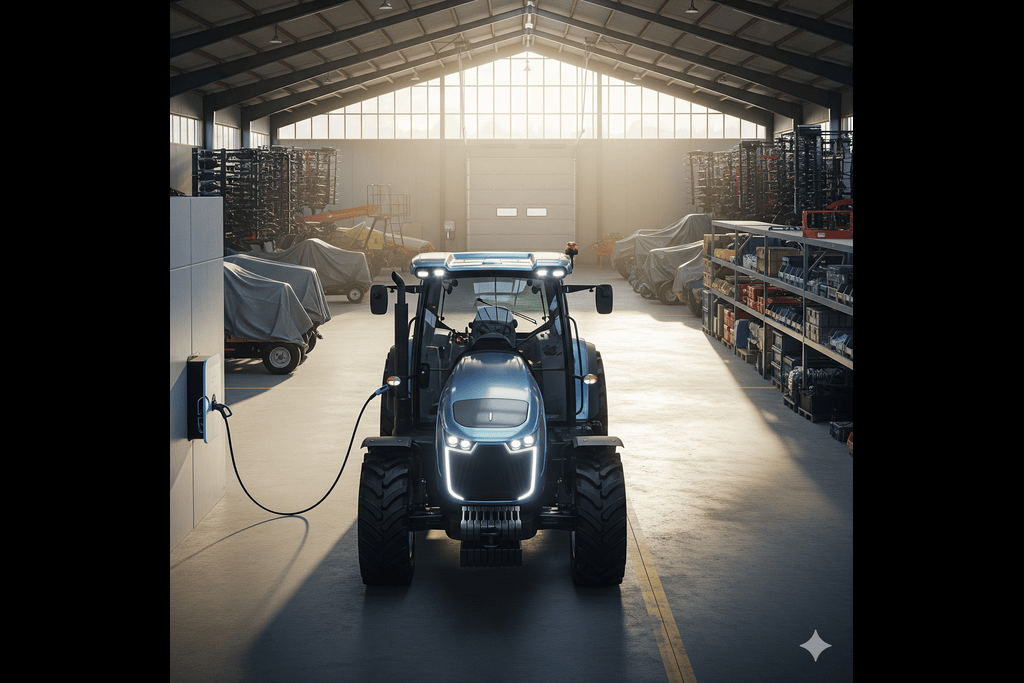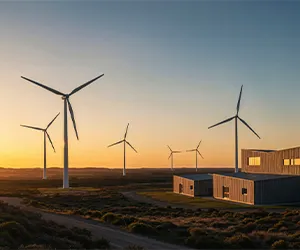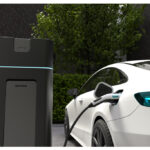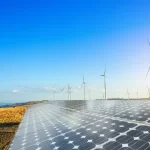Introduction
The world of agriculture is undergoing a transformative shift as electric tractor manufacturers rise to meet the challenges of climate change, fossil fuel dependency, and growing food demand. At the heart of this revolution lies the EV tractor, a cleaner, quieter, and more intelligent alternative to conventional diesel-powered machinery. In line with global efforts to curb emissions and adopt sustainable farming practices, the agricultural sector is embracing carbon-neutral farming like never before.

As smart technologies and renewable energy reshape multiple industries, smart tractors equipped with automation and data-driven capabilities are taking root. The global agricultural machinery market is rapidly pivoting toward battery powered tractor models that combine functionality with environmental responsibility. These advancements signal the dawn of a greener farming era, aligned with global sustainability targets.
Market Overview
The global market for electric tractor manufacturers has witnessed notable acceleration over the last five years. From niche innovation to mainstream consideration, the EV tractor industry is now a focal point of agricultural modernization. The market, once dominated by a handful of startups and experimental models, now features key players like John Deere, Solectrac, Monarch Tractor, and Escorts Kubota.
As the demand for carbon-neutral farming practices intensifies, electric agricultural equipment is becoming a priority across regions including North America, Europe, and increasingly, Asia. In addition to environmental concerns, fluctuating diesel prices and stringent emission regulations are pushing the adoption of smart tractors.
Forecasts suggest that the market for battery powered tractor solutions will grow at a compound annual growth rate (CAGR) exceeding 10% through 2030. Analysts cite increasing support from governments, rising awareness about climate change, and technological readiness as the main growth enablers. In this evolving landscape, electric tractor manufacturers must innovate rapidly while overcoming regional and technological challenges.
Major Challenges
Nevertheless, the EV tractor market has some barriers to scale despite the momentum it has. The expensive production in the form of a sophisticated component, battery pack, and limited production runs is one of the greatest challenges that manufacturers of electric tractors have to overcome. Initial expenses incurred in battery powered tractor models are still much higher than in conventional diesel powered tractors thus will not be adopted easily by small or mid sized farms.
Another bottleneck is battery technology. The existing generation of lithium-ion batteries places restrictions in the range, weight, and recharge time. In the case of large-scale farming activities, short hours of operation may have a devastating impact on productivity. This is one of the fundamental challenges until there is a shift in battery chemistry or the introduction of swappable battery systems to the mainstream.
There is also the problem of infrastructure gaps particularly in the developing regions. The rural regions do not always have enough access to charging stations, so it is challenging to implement EV tractor fleets at scale. The carbon-neutrality in farming is based on the reliable power supply chains that are not yet developed in most of the farming areas.
In addition, farmer hesitancy persists. Smart tractors are new to many farmers who treat innovations with suspicion. In breaking these barriers, education, demonstration, and after sales support are essential. Regional regulatory hurdles, import tariffs, and lack of clear policy guidance also discourage adoption in key markets.
Key Opportunities
These challenges create an environment of huge opportunities. Numerous governments are providing substantial subsidies and tax benefits to encourage electric vehicles to be used in agriculture. With the United States Inflation Reduction Act and India FAME, the electric tractor makers are in the best positions to enjoy this policy environment.
Another tailwind is the need to raise the level of climate awareness in the farming community. With the increase in weather unpredictability and soil degradation, farmers have increasingly embraced carbon-neutral farming methods as a way of guaranteeing long term viability. The EV tractor is something that can be used as a cornerstone technology in this transition, with fewer emissions, lower operating costs, and more compatible with renewables.
New battery driven tractor technologies, particularly solid-state batteries and fast-charging solutions are making efficiency and reliability better. It is also being integrated with solar charging systems that are gaining momentum especially in the sunny areas and farmers can charge their tractors using clean energy.
In addition, there is the emergence of intelligent tractors, which are equipped with GPS, real-time diagnostics and self-driving navigation, which puts a very interesting twist on the electric transition. Developing economies present a special opportunity of going directly to green solutions as the rates of mechanization continue to increase.
Ecosystem-level innovation is being facilitated through strategic alliances between manufacturers of electric tractors, renewable energy firms and agri-tech startups. Such partnerships are critical to the creation of modular frameworks which integrate automation, AI, and sustainable design.
Innovation and Technology
Technology integration is the most thrilling in the EV tractor arena. The use of artificial intelligence (AI), machine learning, and Internet of Things (IoT) solutions redefine the operation of smart tractors. Such machines are now able to interpret field data, anticipate maintenance requirements and control energy consumption optimally on the fly.
Another jump is autonomous driving. Models of self-driving battery powered tractors are already under test and are already deployed in limited systems with reduced reliance on labor, enhancing precision. The innovative concept is especially useful in large farms, which face the problem of labor deficiency.
The other aspect that is very critical is modular and sustainable design. Recycled materials, lightweight frames and open-source hardware are being used by major manufacturers of electric tractors to increase sustainability and repairability. The principles of the design facilitate the overall objective of carbon-neutral farming in terms of minimizing waste and increasing the life cycle of machines.
To become mobile analytics platforms, sensor technologies are being added to track soil health, soil moisture, and crop conditions. These instruments enhance efficiency of farms as well as facilitate climate resilient and data-driven farming.
Solar-powered chargers and battery swap stations are also being tested in rural locations as part of deploying battery powered tractors. Due to the expansion in infrastructure, such innovations would assist in overcoming range and charging bottlenecks.
Regional Case Studies
In India, startups like Cellestial and eTrio are introducing affordable EV tractor options tailored for small landholders. Supported by state-level subsidies, these projects show promise in making carbon-neutral farming accessible to rural populations. Yet, adoption is hindered by awareness gaps and financing hurdles.
In the European Union, countries like Germany and France are leading the transition, with structured roadmaps and investment in rural charging infrastructure. Here, smart tractors are often used alongside precision farming systems, creating advanced farming ecosystems. However, regulatory harmonization across EU states remains a challenge.
In the United States, companies like Monarch Tractor are pushing the boundaries of autonomy and AI. Their all-electric battery powered tractor models are targeting both vineyards and large farms, where environmental standards are more strictly enforced. Federal grants and agricultural electrification programs are helping offset capital costs.
Conclusion
The global movement toward carbon-neutral farming is not just a trend—it is a necessity. As the world faces rising temperatures, soil degradation, and shrinking water resources, the role of electric tractor manufacturers has never been more vital. The rise of the EV tractor marks a pivotal moment in agricultural history—an intersection of innovation, responsibility, and growth.
While challenges like high costs, battery constraints, and farmer hesitancy remain, the opportunities in government support, technological advancement, and market demand clearly outweigh the hurdles. The journey toward widespread adoption of smart tractors and battery powered tractor systems will require collaboration across industries.
To build a truly green and productive future, manufacturers must innovate boldly, policymakers must provide clear frameworks, and farmers must be empowered with knowledge and tools. Together, these stakeholders can steer the industry toward a more sustainable and resilient agricultural future—powered by electricity and driven by vision.
Frequently Asked Questions (FAQs)
An EV tractor is a farm vehicle powered entirely by electricity instead of diesel or petrol. These electric tractors use rechargeable batteries and are a key component of sustainable, carbon-neutral farming practices.
Some leading electric tractor manufacturers include John Deere, Solectrac, Monarch Tractor, Escorts Kubota, and Cellestial. These companies are developing innovative battery powered tractor models with advanced technology.
Yes, modern battery powered tractors are increasingly being designed for both small and large-scale farming. However, battery range and charging infrastructure are key considerations, especially for extended field use.
Smart tractors integrate AI, GPS, IoT, and autonomous features to perform tasks more efficiently. They can analyze data in real-time, improving precision and productivity in carbon-neutral farming systems.
Electric tractor manufacturers face challenges like high production costs, battery limitations, lack of rural charging infrastructure, and farmer awareness. Regional regulations also vary, adding complexity to scaling operations.












